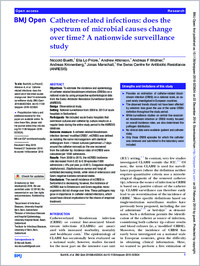Catheter-related infections: does the spectrum of microbial causes change over time? A nationwide surveillance study
- Buetti, Niccolò Department of Infectious, Diseases, University Hospital, Bern, Switzerland
- Priore, Elia Lo Department of Infectious, Diseases, University Hospital, Bern, Switzerland
- Atkinson, Andrew Department of Infectious, Diseases, University Hospital, Bern, Switzerland
- Widmer, Andreas F Division of Infectious Diseases and Hospital Epidemiology, University Hospital Basel, Switzerland
- Kronenberg, Andreas Institute for Infectious Diseases, University of Bern, Switzerland
- Marschall, Jonas Department of Infectious, Diseases, University Hospital, Bern, Switzerland
- Swiss Centre for Antibiotic Resistance (ANRESIS)
-
01.12.2018
Published in:
- BMJ Open. - 2018, vol. 8, no. 12, p. e023824
English
Objectives To estimate the incidence and epidemiology of catheter-related bloodstream infections (CRBSIs) on a national scale by using prospective epidemiological data from the Swiss Antibiotic Resistance Surveillance System (ANRESIS). Design Observational study. Setting National surveillance from 2008 to 2015 of acute hospitals in Switzerland. Participants We included acute Swiss hospitals that sent blood cultures and catheter tip culture results on a regular basis during the entire study period to the ANRESIS database. Outcome measure A catheter-related bloodstream infection (termed ‘modified CRBSI’, mCRBSI) was defined as isolating the same microorganism with identical antibiogram from ≥1 blood cultures (performed ±7 days around the catheter removal) as the one recovered from the catheter tip. Incidence rates of mCRBSI were calculated per 1000 admissions. Results From 2008 to 2015, the mCRBSI incidence rate decreased from 0.83 to 0.58 episodes/1000 admissions (−6% per year, p<0.001). Coagulase-negative staphylococci, Staphylococcus aureus and fungi all exhibited decreasing trends, while rates of enterococci and Gram-negative bacteria remained stable. Conclusions The overall incidence of mCRBSI in Switzerland is decreasing; however, the incidence of mCRBSI due to Enterococci and Gram-negative micro-organisms did not change over time. These pathogens may grow in importance in catheter-related infections, which would have clinical implications for the choice of empirical treatment.
- Faculty
- Faculté des sciences et de médecine
- Department
- Médecine 3ème année
- Language
-
- English
- Classification
- Medicine
- License
-
License undefined
- Identifiers
-
- RERO DOC 324152
- DOI 10.1136/bmjopen-2018-023824
- Persistent URL
- https://folia.unifr.ch/unifr/documents/307746
Statistics
Document views: 153
File downloads:
- pdf: 191
